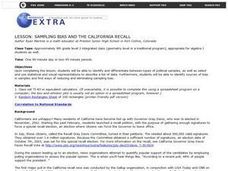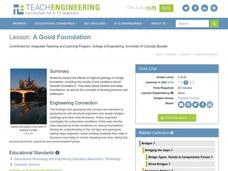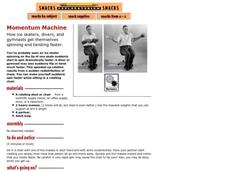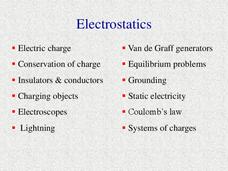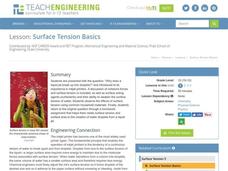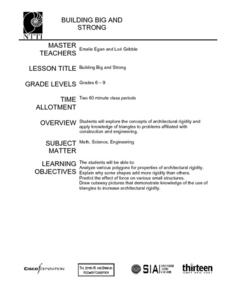Curated OER
Sampling Bias And the California Recall
Using a 2002 California Gray David recall vote as an example, young statisticians identify sources of bias in samples and find ways of reducing and eliminating sampling bias. They consider ways to select random samples from a...
Curated OER
Ride the Rock Cycle
Students identify the steps in the rock cycle. They complete a K-W-L chart before the instructional activity begins. They answer questions about the stages to complete the instructional activity.
Curated OER
Life as a Refugee
Lesson 1 from a Refugees and Human Rights unit is based on the UNHCR video “Working with Refugees.” Pupils gain an understanding of the role the United Nations plays in protecting and assisting refugees worldwide and have an opportunity...
Physics Classroom
Action-Reaction Lab
Computer-interfaced motion detectors are required to carry out this inquiry. It is a new twist on exploring motion with plunger carts: they are set back-to-back and then propelled away from each other. Their velocities are measured, and...
Bowels Physics
Work, Energy, and Power
Work, energy, and their relationship to power: what is the common thread? Explore this with your class as they learn the concepts of work and energy, both kinetic and potential, before completing multiple practice problems to...
Science Matters
Fault Formations
The San Andreas Fault moves about two inches a year, approximately the same rate fingernails grow—crazy! The third lesson in the series allows for hands-on exploration of various fault formations. Through the use of a Popsicle stick,...
Curated OER
Earthquakes: Fifth Grade Lesson Plans and Activities
After learning about P waves and S waves, fifth graders view the intensity of earthquakes by examining seismographs and images of earthquake damage. Young scientists then forecasting future quakes by analyzing data about...
Curated OER
Weathering and Erosion
Students examine the similarities and differences between weathering and erosion. They participate in a lab in which they test the effects of different materials when exposed to weathering and erosion. They record their observations.
Teach Engineering
A Good Foundation
It takes a strong foundation to build a house and a stronger one for a bridge. This resource presents the effects of geology and soil on bridge foundations. Working in groups, the class investigates the interaction of shallow and deep...
Curated OER
Sediment Sleuths
Are you looking for a good, solid lesson on sedimentary rocks? This one, produced by the Illinois State Museum, is just such a lesson. Middle schoolers identify common rocks and minerals by analyzing sediments from local water sources....
Curated OER
Catch the Pollution
Explore environmental care by conducting a pollution experiment. You'll discuss the causes of pollution in our environment and what the overall impact will be if we can't change our ways. Clear plastic tape, a can, and compass are used...
Curated OER
Earthquakes: Third Grade Lesson Plans and Activities
Introduce third graders to energy waves with a hands-on geology activity, in which they answer questions and compare seismograms in the San Francisco Bay area. After a demonstration that shows how bigger waves indicate a...
Curated OER
How Gear Systems Work: A Research Project
Students apply information regarding simple machines along with the math concept "ratios." The teacher introduces the concept that technology is the application of scientific knowledge and mathematics concepts to solve a problem. This is...
Exploratorium
Momentum Machine
If you have a rotating office chair in your classroom, you can have physics pupils participate in this simple, yet effective demonstration of angular momentum. One partner sits in the chair, arms outstretched, holding heavy weights. The...
Urbana School District
Electrostatics
Why did lightning shock the man? Because it didn't know how to conduct itself. Presentation covers electric charges, insulators, conductors, electroscopes, lightning, generators, grounding, static electricity, and more. Presentation...
Teach Engineering
Using Hooke's Law to Understand Materials
Provide a Hooke for a lesson on elasticity with an activity that has groups investigate a set of springs. They use a set procedure to collect data to calculate the spring constant for each spring using Hooke's Law. The groups...
Teach Engineering
Surface Tension Basics
Back to the basics (of surface tension). The first installment of a nine-part series teaches young scholars about the basics of surface tension and how it relates to water droplets. They also learn how this concept allows for the...
DiscoverE
Kinetic Sculpture
Let your creativity run wild. Scholars build a sculpture out of basic materials. These sculptures must be able to move in the wind (from an electric fan). However, they must also withstand the wind enough to not fall over—it's quite the...
Energy for Keeps
Going for a Spin: Making a Model Steam Turbine
Discover the effectiveness of wind, water, and steam as energy sources. The hands-on activity has young scientists create a turbine from common materials. After constructing the turbines, they use wind, water, and steam to turn them and...
Curated OER
Building Big and Strong
Middle and high schoolers explore the concepts of architectural rigidity. They analyze a variety of polygons, and explain why some shapes add more strength to structures than others. The PBS video, "Building Big," is utilized in this plan.
Curated OER
An Arm and A Leg
Students examine how the movements of bones are dependent on the interaction of pairs of muscles. They design and construct a prototype of an artificial limb using a syringe system, and determine whether water or air makes the appendage...
Curated OER
The Grapes of Wrath: Problematic Situation
To prepare for a reading of John Steinbeck's The Grapes of Wrath, kids must prioritize a list of items to take with them on a journey to Texas.
Teach Engineering
Fun with Air-Powered Pneumatics
How high did the ball go? Engineering teams build a working pneumatic system that launches a ball into the air. The teams vary the amount of pressure and determine the accompanying height of the ball. An extension of building a device to...
Teach Engineering
Archimedes' Principle, Pascal's Law and Bernoulli's Principle
What do Pascal's law, Archimedes' Principle, and Bernoulli's Principle have to do with fluid mechanics? The included PowerPoint presentation provides the basic definitions and equations associated with the three. A set of homework...
